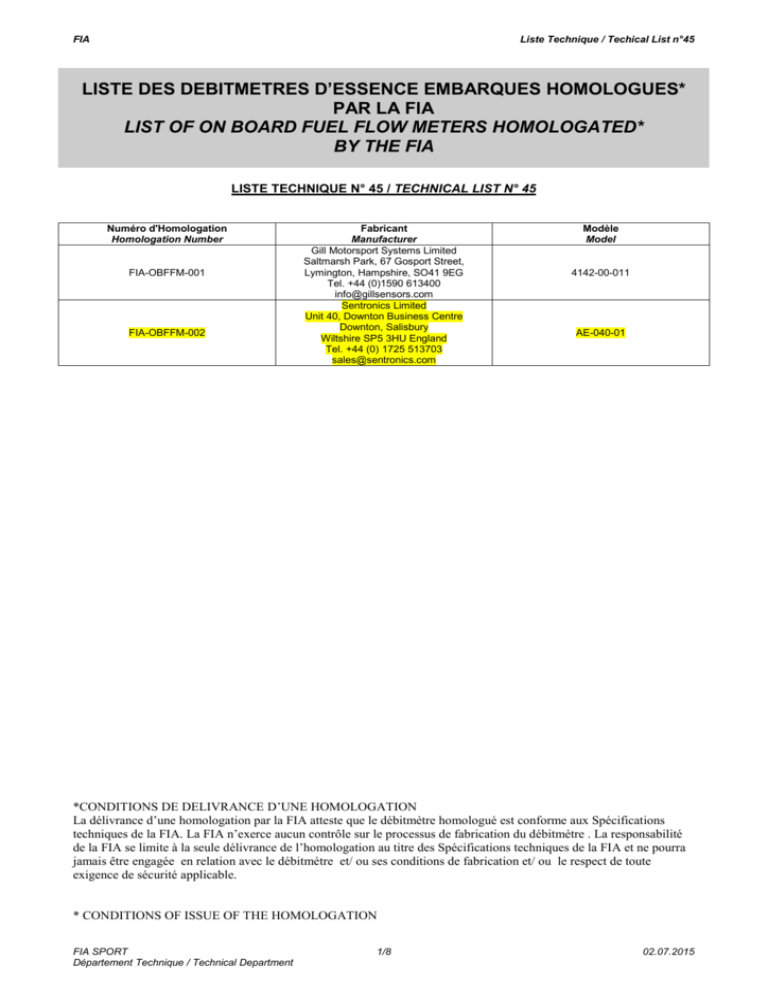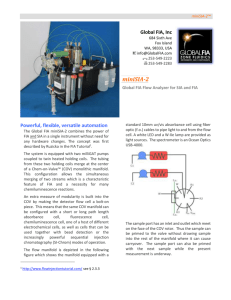list of on board fuel flow meters homologated
advertisement

FIA Liste Technique / Techical List n°45 LISTE DES DEBITMETRES D’ESSENCE EMBARQUES HOMOLOGUES* PAR LA FIA LIST OF ON BOARD FUEL FLOW METERS HOMOLOGATED* BY THE FIA LISTE TECHNIQUE N° 45 / TECHNICAL LIST N° 45 Numéro d'Homologation Homologation Number FIA-OBFFM-001 FIA-OBFFM-002 Fabricant Manufacturer Gill Motorsport Systems Limited Saltmarsh Park, 67 Gosport Street, Lymington, Hampshire, SO41 9EG Tel. +44 (0)1590 613400 info@gillsensors.com Sentronics Limited Unit 40, Downton Business Centre Downton, Salisbury Wiltshire SP5 3HU England Tel. +44 (0) 1725 513703 sales@sentronics.com Modèle Model 4142-00-011 AE-040-01 *CONDITIONS DE DELIVRANCE D’UNE HOMOLOGATION La délivrance d’une homologation par la FIA atteste que le débitmètre homologué est conforme aux Spécifications techniques de la FIA. La FIA n’exerce aucun contrôle sur le processus de fabrication du débitmètre . La responsabilité de la FIA se limite à la seule délivrance de l’homologation au titre des Spécifications techniques de la FIA et ne pourra jamais être engagée en relation avec le débitmètre et/ ou ses conditions de fabrication et/ ou le respect de toute exigence de sécurité applicable. * CONDITIONS OF ISSUE OF THE HOMOLOGATION FIA SPORT Département Technique / Technical Department 1/8 02.07.2015 FIA Liste Technique / Techical List n°45 The grant of a homologation by the FIA attests that the homologated flow meter meets the Technical Specifications of the FIA. The FIA does not have any control over the manufacturing process of the flow meter. The FIA’s liability is limited solely to issuing the homologation as per the FIA Technical Specifications, and cannot be engaged in relation with the flow meter and/or its manufacturing conditions and /or compliance with any applicable safety requirement. FIA SPORT Département Technique / Technical Department 2/8 28.04.2015 FIA Liste Technique / Techical List n°45 SPECIFICATIONS REQUISES POUR LE DEBITMETRE D’ESSENCE EMBARQUE REQUIRED SPECIFICATIONS FOR THE ON BOARD FUEL FLOW METER 1 Introduction 1.1 Scope This specification defines the requirements for the fuel flow meter to be homologated. The sensor will be used in the Formula 1 and LMP1 WEC race series (World Endurance Championship). 2 System Overview 2.1 Measurement Description The device to measure fluid velocity, fluid direction, temperature. The device to compute volumetric flow rate, cumulative mass flow and mass flow rate. Mass flow can be determined from a calculated density-temperature equation/lookup table The sensor should measure the total time on power since last reconditioning. The sensor should measure the total time with flow since last reconditioning. The sensor should measure the total tiem since last power cycle was done. 2.2 Environment Description The flow sensor to operate in the fuel line of a combustion based engine. 2.3 Atmospheric Environment The sensor may be operating in one of two environments: The sensor to operate submerged in the fuel cell of a Formula 1 vehicle (2 barA maximum fuel cell pressure) The sensor to operate surrounded by ambient air in a vented to atmosphere chassis pocket on a LMP1 (WEC) car. 2.4 External End-user Instruments The device will typically be one instrument of several on the CAN bus. The data output from the sensor will be recorded by the FIA data logger over the CAN bus. At the discretion of the regulatory body the teams will also have access to CAN bus data. The acquisition system will be the FIA data logger. The device shall have the ability to exchange its measurement data via CAN. 2.5 Power Source System power for the device to be low voltage DC, provided typically from the data logger or power distribution module. Alternatively a battery pack could be used. 3 General Design Requirements 3.1 Reliability and Service Life 3.1.1 Operation Time The device shall run up to 30 hours continuous without need for cleaning/power cycling 3.1.2 Lifetime between reconditioning The device shall achieve 100 hours of running and still be within performance specification 3.1.3 Lifetime The device shall perform 400 hours of service before its end of life FIA SPORT Département Technique / Technical Department 3/8 02.07.2015 FIA Liste Technique / Techical List n°45 3.2 Safety Requirements The device shall be of non-ferrous construction The device shall not contaminate the fuel line with particulate The device shall not contain materials that contaminate the fuel 4 Physical Requirements 4.1 General The device shall have a volume of less than or equal to 500 cm3 The device shall weigh less than or equal to 400grams The device shall be fitted with std -6AN male fluid couplings The device must be able to be fitted on an LMP1 car (See LMP1 Technical regulations for details). 4.2 Identification The following identifications shall be visible as a minimum: Sensor manufacturer Logo Unit Serial Number Sensor Reference Sensor Part Number The sensor must offer a suitable place for an FIA sticker (25x25mm with 1mm radius) 4.3 Tamper Proofing The device shall be protected by anti-tamper seals suitable for in fuel operation. 4.4 External Connections The device shall use a fuel proof electrical connector 5 Functional Requirements 5.1 Measurement 5.1.1 General Performance The device shall measure between a range of +/- 0-8000ml/min The repeatability from one measurement to another under steady state conditions shall be no greater than +/- 0.25% uncertainty. The device shall have an accuracy of no less than +/-0.5% for post filtered instantaneous flow measurement. The device shall have a 1 kHz minimum measurement rate and allow up to 2 kHz measurement rate The device measurement shall be repeatable from one sensor to the next to +/- 0.25% independent of sensor life. The device shall operate within it's performance specification independent of flow direction. The device shall operate within it's performance specification within a range of fuel pressure (0.5 to 10 barA). The device shall operate within it's performance specification regardless of mounting orientation. The device shall measure cumulative total flow to an accuracy of +/-0.5% The device shall be capable of applying a 4th order low pass Butterworth with 25Hz -3 dB cut-off frequencies to instantaneous flow measurement for CAN transfer The device shall be capable of making mass flow conversions based upon a temperature density equation or look up table. The device shall be within performance specification when undergoing measurement of any of the fuels stated within section 5.8.1 over the specified fuel temperature range. The device shall be able to power up and begin full functionality regardless of startup temperature and flow condition in under 3 seconds. This time must be consistant sensor to sensor. The device shall be able to recover automatically and without action from an incorrect fluid composition (Air bubbles for example). When unable to read flow the device must store the last correct data and count no flow until it is able to measure flow again. On powerup the device shall restore Cumulative volume flow (Stored in the device at a rate of 1Hz) FIA SPORT Département Technique / Technical Department 4/8 28.04.2015 FIA Liste Technique / Techical List n°45 On powerup the device shall restore Cumulative mass flow (Stored in the device at a rate of 1Hz) On powerup the device shall restore Max and Min Fuel Temps (Maximums & minimums only written when exceeded and then at a max rate of 1 Hz ) On powerup the device shall restore Max and Min PCB Temps (Maximums & minimums only written when exceeded and then at a max rate of 1 Hz ) On powerup the device shall restore Max and Min Accelerometer values x,y,z axis (Maximums & minimums only written when exceeded and then at a max rate of 1 Hz) On powerup the device shall restore Max and Min Speed of Sound values [m/s] (Maximums & minimums only written when exceeded and then at a max rate of 1 Hz ) On powerup the device shall restore Max and Min Input Voltage (Maximums & minimums only written when exceeded and then at a max rate of 1 Hz ) On powerup the device shall restore Elapsed time (Total time on power) ( [Mins:Secs] (Stored in the device at a rate of 1Hz) On powerup the device shall restore Service time (Total time with flow) [Mins:Secs] (Stored in the device at a rate of 1Hz) On powerup the device shall restore Max and Min Signal to Noise (Maximums & minimums only written when exceeded and then at a max rate of 1 Hz ) 5.1.2 Temperature Measurement The device shall produce two fuel temperature measurements from two separately immersed temperature sensors that are accurate to within 0.15°C between 0°C and +110°C without factory calibration. The fuel information used for the density calculation shall be the average of the two measurements and it shall switch to one of the two when one is declared faulty. The device shall display the fuel temperature measurement status. The fuel temperature measurements shall have a response time of T95% of 4seconds The device shall produce a PCB temperature data output that is accurate to within 0.5°C between 0°C and +85°C without factory calibration. 5.2 Loom detect The device should automatically switch to the correct CAN address according to the loom resistance : 0x190 : No resistor or 22 kOhm 0x194 : 5.6 kOhm 0x198 : 1.8 kOhm In addition to the automatic loom detect, the device should allow the FIA approved calibration company to adapt the CAN address. A minimum of 6 CAN address should be available, 3 of which can be the same as the auto loom detect CAN addresses. 5.3 Calibration The device shall be able to be calibrated on top of the factory calibration. The following maps must be programmable only via RS-485 connection: Informations related to density calculation Complete calibration map f(Temperature/flow) 5.4 CAN / DATA LOGGING The device should communicate by CAN the channels listed in the following documents. This CAN communication must be done in accordance with the following CAN specification: Fuel Flow Sensor CAN FIA_2015 Message 191 MUX_v12 CAN communications shall meet ISO 11898-2 (High Speed Applications) 5.5 Encryption The device shall not allow unauthorised access to firmware and memory locations over RS-485 or CAN. The device should create and display checksums allowing to determine if the correct calibration data are programmed in the sensor. The device should create and display checksums allowing to determine if the correct firmware and hardware is present in the sensor. FIA SPORT Département Technique / Technical Department 5/8 28.04.2015 FIA Liste Technique / Techical List n°45 5.6 Electrical Requirements 5.4.1 Power Supply A Minimum Supply Voltage of 4.5VMin shall apply A Maximum Supply Voltage of 22VMax shall apply A Nominal Supply of 12VNom shall apply. Overvoltage (Non-destructive) of 30VTransientClamp shall apply. Maximum Continuous Reverse Supply (Non-destructive) of -30VRevMax shall apply. The supply current shall be less than or equal to 100mA from 12-17VDC The supply current shall be less than or equal to 180mA from 4.5-5.5VDC The devices power supply circuitry shall be protected from reverse polarity The devices power supply circuitry shall be protected from ground and battery short circuits 5.6.1 Reset The device should be able to receive a reset (Power Cycle) command by CAN. The device should be able to reset the cumulative mass and volume data from a CAN command. 5.7 Electromagnetic Compatibility 5.7.1 Immunity Requirements The device shall meet EMC Immunity SAE J1113/2 1996 5.8 Environmental Requirements 5.8.1 Fluid Compatibility The sensor shall be compatible with the following fuels: Gasoline/Petroleum including Unleaded Formula One Fuel (as defined in the F1 FIA Technical Regulations) Ethanol E10,E20,E50,E85R,E100 Methanol & all gasoline/methanol blends Butanol(n-Butanol)& all gasoline/butanol blends Avgas,JP4,JP5 Diesel Biodiesel Avgas 100LL LPG Propane/Butane 5.8.2 Temperature 5.8.2.1 Fluid Temperature The device must operate with a maximum fuel temperature of 110°C The device must operate with a minimum fuel temperature of 0°C 5.8.2.2 Unit Operating Temperature The device must operate with a maximum PCB temperature of 85°C The device must operate with a minimum PCB temperature of 0°C 5.8.2.3 Storage Temperature The device must not be adversely affected by a storage temperature minimum of-40°C The device must not be adversely affected by a storage temperature maximum of 85°C 5.8.3 Pressure The pressure drop of the device shall be no greater than 1000 mbar @ 6000ml/min in a 3mm^2/s viscosity fluid at 40degC The device must be burst resistant to 60barA The device shall operate with a liquid pressure of up to 20 barA. FIA SPORT Département Technique / Technical Department 6/8 28.04.2015 FIA Liste Technique / Techical List n°45 5.8.4 Vibration Vibrations should not affect measurement precision of the sensor. 5.8.5 Sealing The device must be fully sealed to IP68 6 Glossary/Nomenclature 6.1 Nomenclature F1- Formula One World Championship WEC- World Endurance Championship (Sport Cars) DOORS- Dynamic Object Oriented Rationale System. It is an IBM requirement management tool. FIA- (Fédération Internationale de l'Automobile) FIA F1 Logger Spec- FIA SDR (Surveillance Data Recorder) LMP1- Le Mans Prototype class 1 FIA SPORT Département Technique / Technical Department 7/8 28.04.2015 FIA Liste Technique / Techical List n°45 UNDERTAKINGS FROM THE FLOW METER MANUFACTURER Once it is proven to FIA that the sensor meets the technical specifications stated above, the sensor manufacturer must fulfil the below requirements in order to grant and retain homologation for its sensor: - The sensor’s manufacturer must provide to FIA, free of charge, a minimum of 4 sensors. These sensors must be identical to the homologated sensor. FIA will be able to use them as needed, on any car or bench. The sensor’s manufacturer will maintain, update and replace these sensors free of charge. - The sensor’s manufacturer must provide to FIA a GUI in accordance with the following specification: GUI_Specifications.do cx - The sensor’s manufacturer must provide to FIA all needed licences allowing the access and actions describe in the GUI specification. FIA must be able to lend these licences (And hence GUI) to a third party (FIA representative on track or FIA homologated calibration company). Preferably, these licences should be dealt by MAC Addresses. FIA SPORT Département Technique / Technical Department 8/8 28.04.2015




